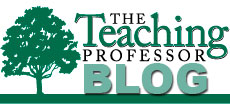There’s a definitional “looseness” about many of the terms commonly used in higher education. I know, I’ve written about this in previous blogs, but when terms are bandied about assuming everybody defines them similarly, that’s a recipe for misunderstanding. Equally important, we can be using terms without having done the intellectual homework necessary to precisely understand their referents.
Read more ›CURRENT ARTICLE • February 09
OTHER RECENT ARTICLES
I’ve been reading pedagogical literature for a long time and so I don’t often come upon a topic I haven’t seen before. But this week I came across one — it was an article on conversation in an international faculty development journal.
Read More ›“Rarely does an examination ask students to list questions that the course posed for them.” C. Roland Christensen made that observation. “Rarely?” I can’t remember ever hearing of an exam that asked students to list questions. One time early in my teaching career, I came to an exam review session with a list of answers and asked students to pose the questions. It was April Fool’s Day, but my students didn’t find the strategy the least bit funny. It was a much more difficult task than I anticipated and the possibility that they might have to do this on the exam created near panic. I think that was the first time I realized how answer oriented students are. Later I came to understand that the same applies to many teachers.
Read More › It’s a good question and on days when getting them to discuss feels a lot like prodding reluctant mules, it’s easy to be cynical about learning outcomes. But most faculty believe in discussion and try hard to make it work. Would we make the effort if we didn’t think the learning potential was there?
It’s a good question and on days when getting them to discuss feels a lot like prodding reluctant mules, it’s easy to be cynical about learning outcomes. But most faculty believe in discussion and try hard to make it work. Would we make the effort if we didn’t think the learning potential was there?
Last week’s “Sink or Skim” blog post on students and reading generated some comments! Yes! Thank you!
Read More ›The Teaching Professor Blog is now located on Magna’s Faculty Focus website. We are happy to be here and happy to be welcoming new readers. As our regular readers know, this blog contains a variety of content. It may highlight findings from a study, describe an instructional strategy, raise issues and concerns, or comments on solutions. It regularly offers advice, aspiring to propose ways and means that enhance learning. And sometimes the message is inspiration. Teaching isn’t always easy and learning can seem very elusive.
Read More ›Still finishing up? I remember one semester when I was doing my final grading in my office on a Saturday morning. It was very close to Christmas. I finally finished, submitted the grades, and exuberantly headed home with Christmas music on the radio far louder than it should have been. It was such a relief to finally be finished. At a stop light, I was singing with the radio and thinking about making Christmas cookies. The light changed and I zoomed forward, failing to notice the car in front of me had not zoomed forward. I did not exuberantly drive the rest of the way home.
Read More ›What can I offer this week, which for many is one of the busiest weeks of the semester? It is such stressful time for teachers and students—everybody gets tired, even the best of us get cranky. I know what many teachers would love to have: a grading machine, delivered overnight with no assembly required.
Read More ›Here’s Margaret Morganroth Gullette’s great description of feelings associated with discussion. “Discussion … can feel light-weight, loose jointed, like holding hands in zero gravity. The sense of weightlessness can overcome you—even if you’re good enough at leading discussion so that your students are uninhibited and exploratory; even if you guide it subtly by the weight of a question or an inquiring gesture; even if you’re sure that at each session they’ve learned three new ideas in the most unforgettable way, by discovering them and stating them themselves.” (p.32)
Read More ›“The type of assessment used in a course provides a clear indication of what the course goals truly are. No matter what the teacher says, tests are proof of whether the goals are memorization of chemical facts, plug-and-chug mathematical problem solving, or the ability to understand and apply the concepts of chemistry.” (p. 678)
Read More ›




